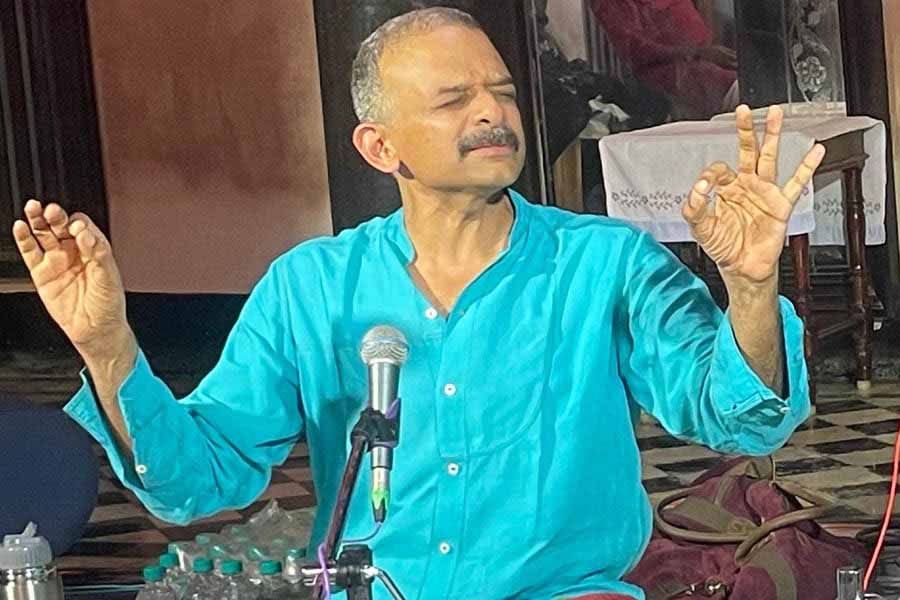It is hot and humid. A late monsoon dump has forced the location for the concert to be moved from the temple into one of the many Chettinad mansions hidden in plain sight, in a group of dusty villages well south of Chennai. Miracle survivors of the Chettiar diaspora and then serial rapes by antique dealers, these are cosseted treasures. In one, the audience of 150 is seated in a covered courtyard on chairs, on the tiled floor, on the courtyard’s stone veranda step. Protected from rain, but not humidity, sari pallus are doubling as face wipes, a few enviable ladies are flapping their fans.
But nothing daunts TM Krishna’s total concentration. He is in the moment. His voice soars, swoops, trills with passion, drops to a whisper, flirts with the accompanying violin, fades almost into the air, returns with a celebratory smile. It fills the double-storey, central courtyard of this monumental setting. Like others, with their multiple courtyards, teak columns and intricately carved doors, it was built for a large household, but is now brought to life for big family gatherings – births, weddings, mourning, padaippu (ancestor prayers), and birthdays of lucky males reaching the grand ages of 60, 70, or more. Today, it is the ancestral home of Meenakshi Meyyappan, fondly known as Aachi, who left Chennai in 1997 to devote her phenomenal energies to reviving ‘everything Chettinad’. The audience are her invitees to the third edition of her remarkable Chettinad Heritage & Cultural Festival.
It is a measure of her magnetic force that she can entice TM to open the festival. But who could refuse Meenakshi, a youthful 90-year-old, sparkling eyes alert to the next innovative idea? He’s billeted in the hotel she founded, The Bangala, renowned for its generous hospitality and daily banquets of Chettinad cuisine. At meals, he tucks in while talking of her fondly.
Indeed, they share common, unexpected ground. Krishna Meyyammai sets this out in her introduction to the concert. ‘Venga, venga, venga’, she cries out to him, the Tamil word for being deeply moved, touched and blessed. She goes on to explain that in her conservative Nagarathar community here (whose men are called Chettiars and women called Aachis), while patronage has been lively ‘we have an inhibition to practise it ourselves. I am the first classical Bharatanatyam artist from this community!’ She concludes: ‘I salute you for putting heart and soul into equality.’ Just as Meenakshi and Krishna are disruptors, so is TM. This is their common ground.
We then listened as TM sang, and sang. He began with a song to Kapali, followed by one written by the 20th-century Tamil composers Anai and Ayya. Interrupting his own flow, he asked Meenakshi ‘How long can I sing for?’. She replied: ‘No rush!’. So, he gave us the traditional Kannada raga, followed by a composition of Muthuswami Dikshitar, then a contemporary song on the sparrow, written with Tamil writer Perumal Murugan, part of their series on birds, and ended with a bhajan by Tulsidas.
But, how does a vocalist who has reached the highest level of Carnatic discipline only to say boldly that he ‘belongs to a tradition but is not owned by it’ and is ‘very critical of the classical world… its snootiness, its caste and gender supremacy’, and who goes to sing on public transport and in villages… how does such a man decide what to sing to this elite audience in this elite setting? Is he comfortable?
‘I can’t discard it. I’m elite, I’ve had everything’, he says frankly. ‘There is a need to have discord. The people tonight know who I am. I’m having conversations with them, honest ones. These people are elite, but I feel they are good. If some are experiencing discomfort, maybe that’s a good thing.’
And how does he decide what to sing to such a group? ‘I just come on stage and let it go!’. Adding, to keep the record straight, ‘That’s most of the time’. He can pre-plan his programme very precisely, for maximum effect. For although his repertoire is mostly devotional, his contemporary work is consciously ‘pushing out in content about society, environment and against discrimination. When I was invited to sing at the ISB Hyderabad, I sang about manual scavenging overtly. I wanted them to be rattled’.

‘I challenge through performance. I’d like to believe that the work I’ve put in has put seeds of thought into people.'
— TM Krishna
Aware of his position of power, TM is impatient for change. ‘I challenge through performance’, he says. ‘I’d like to believe that the work I’ve put in has put seeds of thought into people.’ He finds cultural change to be very slow ‘although in the past 15 years, the young generation has come a long way — I know because I have young people coming for advice.’ He finds these people ‘far more thoughtful than I ever was at that age, far more open and happily vulnerable than our generation’.
Disrupting the classical to keep it alive, to put it in the public space and make it more widely accessible, would be a recurring theme for the four-day Chettinad festival.










